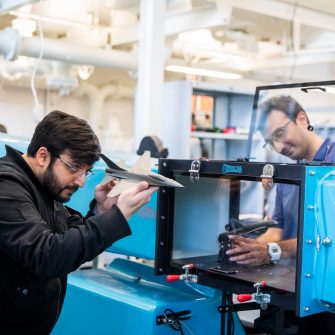Bachelor of Engineering (Honours) (Renewable Energy)
- Commencing Terms
- Term 1, 2 & 3
- Duration
- 4 Year(s)
- Delivery Mode
- Face-to-face (includes blended)
- Campus
-
Kensington
- Codes
- UAC code 425200
- Program code 3707
-
2025 Indicative first year full fee
- $8,000*
-
2025 Indicative full fee to complete degree
- $36,500*
-
2025 Indicative first year full fee
- $58,500*
-
2025 Indicative full fee to complete degree
- $253,500*

UNSW is introducing a new academic calendar from 2028.
What does this mean for my studies? UNSW is moving to a new ‘flex-semester’ calendar.
- Overview
- Entry requirements
- What will I study?
- Future careers
- Double degrees
- How to apply
- Fees & Scholarships
Overview
This degree explores the best ways to make use of renewable energy technologies, including solar thermal systems, photovoltaics, wind and biomass. It borrows much of its structure from other areas of engineering, drawing resources from all around UNSW into a consolidated degree supporting learning for this growing industry.
Many elements of this degree are drawn from Photovoltaics & Solar Energy, but it looks beyond the sun as a source of energy, encompassing a wider range of technologies and their uses. It also addresses the important areas of solar architecture and the design of energy-efficient buildings and appliances. To get you work ready, you'll apply your skills through 60 days of approved industry training.
Why study at UNSW?
The School of Photovoltaic and Renewable Energy Engineering (SPREE) is a leading provider of world class education and research, specialising in education for both undergraduate and postgraduate students.
We offer innovative teaching techniques to enhance your learning including the 'Virtual Production Line' and 'Virtual World Solar Car Challenge'. Our school is well equipped for world-leading research with the Tyree Energy Technology Building and the Solar Industrial Research Facility.
The laboratories at the Tyree Energy Technology Building (TETB) are equipped with deposition, etching, structuring, simulation, and metrology tools which allows for a wide range of photovoltaic and renewable energy research.
Benefits of studying with us:
- We place strong importance on the translation of research into practice
- We produce internationally acclaimed research, working closely with industry to provide innovative solutions to the sector
- Our academics are world experts in their fields and are internationally respected and recognised
- We have close industry ties with partners including Suntech, China Sunergy, LG Electronics, Tongwei, Adani, CSR, BlueScope, AECOM and the NSW Government.
We're ranked #1 in Australia and #25 globally for Engineering and Technology. All eight of UNSW's Engineering schools are ranked in the global top 50 with two schools ranked in the global top 10 for Engineering subjects (QS World University Rankings by Subject, 2025).
Further rankings from QS World University Rankings by Subject, 2025:
- Ranked #1 in Australia for Civil and Structural Engineering
- Ranked #1 in Australia for Electrical Engineering
- Ranked #1 in Australia for Mechanical, Aeronautical and Manufacturing Engineering
- Ranked #1 in Australia and #2 globally for Mineral and Mining Engineering
- Ranked #2 in Australia for Chemical Engineering
- Ranked #2 in Australia and =#10 globally for Petroleum Engineering
- Ranked #4 in Australia for Computer Science
UNSW is known for its graduate employability, with UNSW awarded the Most Employable students for six years in a row (Australian Financial Review (AFR) Top100 Future Leaders Awards, 2020-2025).
At UNSW Engineering you’ll benefit from a diverse and welcoming community with plenty to keep you busy. UNSW Engineering boasts 16 student societies including a society for each school. Get involved in Queer Students in Stem, Women in Renewable Energy Society or Robogals. UNSW’s Women in Engineering (WIE) society runs social and industry events as well as programs designed to mentor and develop female engineers.
Want to see more from UNSW Engineering?
Entry requirements
Assumed knowledge
Mathematics Extension 1, Physics
Adjustment Factors
We offer a range of adjustment factor schemes that reward students for academic performance and extra-curricular achievements. These schemes also take into account a range of personal and educational disadvantages that may have affected your studies.
HSC Plus
This scheme rewards students who perform well in Year 12 subjects that are relevant to their preferred UNSW degree. You may be awarded up to five points.
Elite Athletes, Performers and Leaders (EAPL)
This program recognises achievements in the areas of sport, academia, leadership and music at an elite level. You may be eligible for up to five points.
Educational Access Scheme (EAS), opens in a new window
Factors such as illness, financial hardship, language difficulties or attending a particular school can mean you don't always get the best possible marks in Years 11 and 12. If one of these situations applies to you, submit an application for the Educational Access Scheme (EAS) via UAC. Eligible students can receive between 1 and 10 points towards their chosen UNSW degree.
Admission pathways
TAFE Pathways Program
This degree is eligible for the TAFE Pathways Program. If you've completed a qualification under a relevant TAFE Training Package, you may be eligible for credit transfer. For more details, including this program's TAFE Pathway study plan, visit UNSW TAFE Pathways Program.
This degree is eligible for admission through our Portfolio Entry Early Conditional Offer Scheme. Complete a submission to demonstrate your passion and performance in relevant subjects. Successful applicants will receive an early conditional offer with an adjusted ATAR entry requirement.
English language requirements
You may be asked to provide evidence of your English proficiency to study at UNSW depending on your educational background and citizenship. English language skills are vitally important for coping with lectures, tutorials, assignments and examinations - this is why UNSW requires a minimum English language competency for enrolment.
If you’re completing an Australian Year 12 qualification (e.g. NSW HSC or equivalent), you do not need to provide anything extra to prove your proficiency. Your qualification will be used as evidence of your English proficiency.
If you do need to provide evidence of your English proficiency, this will be indicated in your application. You can prove this by providing evidence that you meet one or more of the following criteria:
- English language tests and university English courses
- Prior study in the medium of English
- Other qualifications
If you need to improve your English skills before you start your degree, UNSW College’s Academic English Programs are for you. The programs are suitable for various English levels and help you prepare for university studies and life in Australia.
For more details, visit the English Language Requirements page.
International direct entry
| Qualifications | Direct entry requirement |
|---|---|
|
International ATAR
|
85.0
|
| UNSW Foundation Studies GPA |
7.5
|
|
Great Britain General Certificate of Education (GCE A levels)
|
11.0
|
|
International Baccalaureate Diploma (IB)
|
32.0
|
|
Scholastic Aptitude Test (SAT) (after 2016)
|
1210.0
|
We do not accept secondary qualifications from this country. We may accept tertiary study results, please contact us for more information.
Please contact us for direct entry requirements.
Admission pathways
If you do not meet the requirements for direct entry into your chosen degree, you may be eligible for a pathway program with UNSW College. UNSW College provides alternative entry options using university-approved content so that you can start your UNSW journey with confidence.
English language requirements
You may be asked to provide evidence of your English proficiency to study at UNSW depending on whether you are from an English-speaking background or non-English speaking background. English language skills are vitally important for coping with lectures, tutorials, assignments and examinations - this is why UNSW requires a minimum English language competency for enrolment.
If English is not your first language, you’ll need to provide proof of your English proficiency before you can be given an offer to study at UNSW. You can do this by providing evidence that you meet one or more of the following criteria:
- English language tests and university English courses
- Prior study in the medium of English
- Other qualifications
If you need to improve your English skills before you start your degree, UNSW College’s Academic English Programs are for you. The programs are suitable for various English levels and help you prepare for university studies and life in Australia.
For more details, visit the English Language Requirements page.
Check the specific English language requirements for this program
What will I study?
Program structure
This degree explores the best ways to make use of renewable energy technologies, including solar thermal systems, photovoltaics, wind and biomass. A large portion of the degree structure brings together other areas of engineering, drawing resources from all around UNSW into a consolidated degree supporting learning for this growing industry.
You’ll study portions of the Bachelor of Honours in Photovoltaics & Solar Energy but look beyond the sun as a source of energy, encompassing a wider range of technologies and their uses. Your education also addresses the important areas of solar architecture and the design of energy-efficient buildings and appliances.
Full program structure
Degree structures can vary depending on the number of courses you choose and timetabling, to give you an indication you can consider the below.
In your first year you might study:
Two introductory courses in Mathematics
An introductory course in Physics,
and an introductory course in Computing
You may also study an introductory course related to your specialisation of choice. These courses equip you with the skills required for the rest of your Engineering degree.
All students study ENGG1000 “Introduction to Engineering Design and Innovation”. In this course you’ll learn to think the way that engineers think, developing solutions with limited budget, time and resources.
In your second year you’ll undertake:
Courses from your selected specialisations
Core courses to give you the fundamental knowledge in your area of interest
In your third and fourth year you’ll develop your knowledge further with a range of core and elective courses.
During your degree you’ll be required to complete two General Education electives. These courses help you broaden your education by completing several courses from outside the engineering faculty strengthening your cross-disciplinary thinking, developing a flexible approach and enhancing your critical analysis skills.
This degree also requires you to complete 60 days of industrial training, which gives you some on the job experience before graduating. This multidisciplinary educational approach connects students, academics and industry enabling you to develop the essential technical and professional skills, so you thrive in your future career.
Future careers
Careers in renewable energy engineering are becoming more popular as our global awareness of sustainability grows. As the size of the sector grows so too does the number of jobs for renewable energy engineers.
Graduates of this degree can work in a wide range of companies, designing, installing and operating renewable energy generating systems such as wind, solar, biomass or hydro systems. You could also work on designing and constructing energy efficient buildings.
Our UNSW graduates have gone on to work in roles such as:
- Project manager
- Renewable energy engineer
- Protection engineer
- Energy consultant
- Solar and battery design engineer
Potential careers
- Manufacturing
- Quality control and reliability
- Computer-aided design of devices and systems
- Policy formation
- Programs for developing countries
- Energy utilities
Accreditation
This degree is globally recognised and is accredited by Engineers Australia and acknowledged by the Washington Accord.
Part of this degree involves applying your skills through 60 days of approved industrial training in Australia or overseas. Your industrial training will give you a taste of a real-world professional engineering setting and the hands-on experience to become career-ready.
Double degrees
Combine your talents and passions to discover future opportunities suited to your unique strengths. Despite the name, double degrees are not double the workload! You'll study core courses in two areas of expertise, graduating with two qualifications in less time than it takes to complete two consecutive degrees.
Double your knowledge, skills, and career options with the Bachelor of Engineering (Honours) and:
- Advanced Mathematics (Honours)
- Advanced Science (Honours)
- Arts
- Commerce
- Computer Science
- Engineering Science
- Fine Arts
- Law
- Science
*Double Degree only available with some Bachelor of Engineering (Honours) specialisations.
How to apply
Applications for undergraduate study from domestic students (Australian citizens, Australian permanent residents, Australian permanent humanitarian visa holders and New Zealand citizens) are processed by the Universities Admissions Centre (UAC).
Visit the Apply section of the UAC website, opens in a new window and you can nominate up to five degrees in order of preference, with the first being your most desired degree and university.
On-time applications for admission usually close at the end of September each year for Term 1 admission. Late applications can be submitted, but a late fee will apply. For study starting in Term 1, the majority of offers are made in December and January. Visit the UAC website, opens in a new window for key dates for admission outside of Term 1.
Ready to start your application?
For most international students, applications are submitted via our Apply Online service. We encourage you to submit your completed application as early as possible to ensure it will be processed in time for your preferred term.
Some high-demand programs with limited places, may have an earlier application deadline or may have an earlier commencement date. For more information visit our international applicant information page.
*If you are an international student studying an Australian qualification, go to the Universities Admission Centre (UAC), opens in a new window for application and UAC key dates. Note: If you are under 18 years of age, you need to make special arrangements. Read more.
Ready to start your application?
Fees & Scholarships
Commonwealth Supported Place: Student Contribution Band 2
*The student contribution for a Commonwealth Supported Place is an indication only of the amount payable in Year 1 based on a standard full-time load of 48 credit points (1.0 EFTSL). The actual student contribution you will be liable for depends on your individual program of study and the calendar year in which you enrol. Actual fees are calculated upon enrolment. Student contribution amounts are subject to annual review by the university and may increase each year during your studies (subject to caps determined by the Australian Government), effective at the start of each calendar year.
The indicative fees listed here are based on an estimated average and are for tuition only - other fees and charges are not included.
*Fees are subject to annual review by the University and may increase annually, with the new fees effective from the start of each calendar year. The indicative fees listed here are based on an estimated average and are for tuition only, other fees and charges are not included. The amount you pay will vary depending on the calendar year to enrol, the courses you select and whether your study load is more or less than 1 Equivalent Full Time Student Load (8 courses per year).
Indicative fees are a guide for comparison only based on current conditions and available data. You should not rely on indicative fees. More information on fees can be found at the UNSW fees website.
Indicative fees to complete the program have been calculated based on a percentage increase for every year of the program. Fee increases are assessed annually and may exceed the indicative figures listed here.
Indicative fees to complete the program include tuition plus an estimate of study-related costs of approximately $1,000 per year. To find out more about other costs, visit UNSW International.
Scholarships
At UNSW, we award over $83 million in scholarships each year. We pride ourselves on rewarding excellence and making university accessible to students from all walks of life. Whether you’re a domestic or international student, our range of scholarships, prizes and awards can support your journey.
Featured scholarships
Women in Engineering Scholarships
UNSW provides a wide range of Women in Engineering scholarships to support high-achieving female students throughout their degree.
Apply here and search for ‘Engineering’ in the keywords.
Engineering Rural Scholarship
The Faculty of Engineering Rural Scholarships Program aims to assist high achieving high school students from rural or isolated areas to study in the Faculty of Engineering at UNSW.
Apply here and search for ‘Engineering’ in the keywords.

QS World University Rankings, 2025

AFR Top100 Future Leaders Awards, 2020-2025

#1 Australian uni attended by start-up founders





